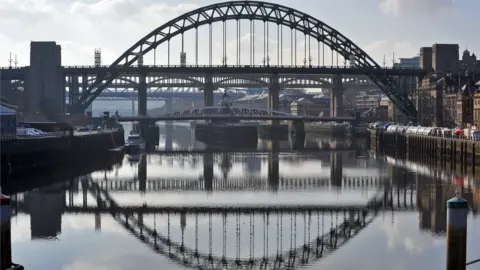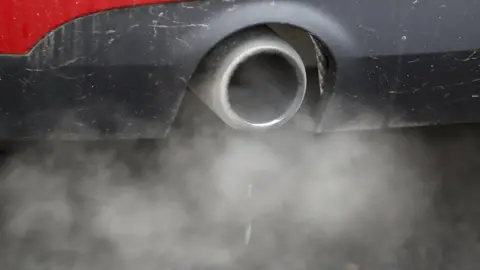Pollution charge may be brought to Newcastle and Gateshead
 Jeff Overs/BBC
Jeff Overs/BBCDrivers could be charged up to £50 a day to enter city and town centres across Tyneside to try to cut road pollution and improve air quality.
Lorries and buses would face the highest charges, with car and van drivers paying up to £12.50 a day.
Tolls of up to £3.40 on the three major road bridges across the River Tyne are also being considered.
The plans, by Newcastle, Gateshead and North Tyneside councils, are being put out to public consultation from March.
The authorities say they are faced with a "public health crisis" caused by traffic pollution and must meet government clean air targets by 2021.
Potential measures include the creation of Clean Air Zones in central Newcastle and Gateshead and on key commuter routes.
 PA
PACars and taxis that fail to meet minimum emissions standards would pay £12.50 a day to enter the zone, with the most polluting buses and lorries paying £50 a day.
Other options include the introduction of tolls for all drivers using the Tyne, Redheugh and Swing Bridges linking Newcastle and Gateshead.
Nick Forbes, Labour leader of Newcastle City Council, said: "This is a public health crisis that has been several decades in the making.
"We have a responsibility both legally and morally to do something about it."
Measures to support people and businesses cope with potential charges include a scrappage scheme to help people upgrade vehicles and help for people on lower incomes switch to public transport.
'Urgent collective action'
The consultation will run from 6 March to 17 May.
Last month taxi drivers in Newcastle gathered more than 1,000 signatures to a petition opposing the introduction of tolls.
The Newcastle Hackney Carriage Drivers Association said tolls would be an "injustice" that would push prices up for motorists and commuters.
The Department for Environment, Food and Rural Affairs said "urgent collective action" was needed and it was working with councils to improve local air quality.
Local authorities had been given nearly £500m for improvements but were "best placed to decide how to tackle air quality in their communities", a spokesperson said.